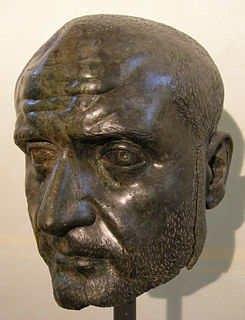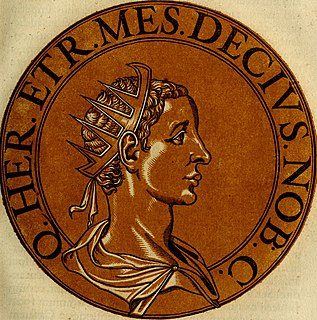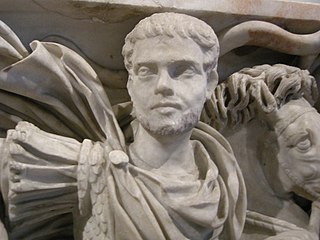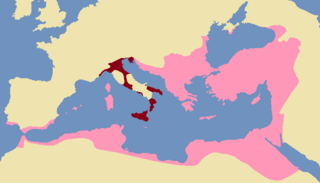
The Battle of Abritus, also known as the Battle of Forum Terebronii, occurred near Abritus in the Roman province of Moesia Inferior in the summer of 251 between the Roman Empire and a federation of Gothic and Scythian tribesmen under the Goth king Cniva. The Roman army of three legions was soundly defeated, and Roman emperors Decius and his son Herennius Etruscus were both killed in battle. They became the first Roman emperors to be killed by a foreign enemy. It was one of the worst defeats suffered by the Roman Empire against Germanics, rated by the Roman historian Ammianus Marcellinus as on par with the Battle of the Teutoburg Forest in AD 9, the Marcomannic invasion of Roman Italy in 170, and the Battle of Adrianople in 378.

Trebonianus Gallus, also known as Gallus, was Roman Emperor from June 251 to August 253, in a joint rule with his son Volusianus.

Herennius Etruscus, was Roman emperor in 251, ruling jointly with his father Decius. He was born in c.227 AD. His father was proclaimed emperor by his troops in September 249 while in Pannonia and Moesia, in opposition to Emperor Philip the Arab. Decius defeated Philip in battle, and was also proclaimed emperor by the Roman Senate. Herennius Etruscus was elevated to caesar in 250, then further raised to augustus in May 251. When the Goths, under Cniva, invaded the Danubian provinces, Herennius Etruscus was sent with a vanguard, followed by the main body of Roman troops, led by Decius. They ambushed Cniva at the Battle of Nicopolis ad Istrum, routing him, before being ambushed and routed themselves at the Battle of Beroe. Herennius Etruscus was killed in the Battle of Abritus, alongside his father. After the deaths of both emperors, Trebonianus Gallus, who had been governor of Moesia, was elected emperor by the remaining Roman forces.

Hostilian was Roman emperor from July to November 251. Hostilian was born to Decius and Herennia Etruscilla at an unknown date and elevated to Caesar in May 251 by Decius, the same month as his older brother, Herennius Etruscus, was raised to co-emperor. After Decius and Herennius Etruscus were killed at the Battle of Abritus, an ambush by the Goths, Trebonianus Gallus was proclaimed emperor by the legions. Almost immediately, he elevated Hostilian to co-emperor and his son, Volusianus, to Caesar. Hostilian died in November 251, either due to plague or being murdered by Trebonianus Gallus.

The term exarch comes from the Ancient Greek ἔξαρχος, exarchos, and designates holders of various historical offices, some of them being political or military and others being ecclesiastical.

The Exarchate of Ravenna or of Italy was a lordship of the Byzantine Empire in Italy, from 584 to 751, when the last exarch was put to death by the Lombards. It was one of two exarchates established following the western reconquests under Emperor Justinian to more effectively administrate the territories, along with the Exarchate of Africa.

Cniva was a Gothic chieftain who invaded the Roman Empire. He successfully captured the city of Philippopolis in 250 and killed Emperor Decius and his son Herennius Etruscus at the Battle of Abritus as he was attempting to leave the Empire in 251. This was the first time a Roman Emperor had been killed in combat against barbarians. He was allowed by the new Emperor Trebonianus Gallus to leave with his spoils and was paid tribute to stay out of the empire.

Volusianus, also known as Volusian, was a Roman Emperor from November 251 to August 253. His father, Trebonianus Gallus, became Roman Emperor after being elected in the field by the legion, following the deaths of the previous co-emperors Decius and Herennius Etruscus. Trebonianus Gallus raised Hostilian, the son of Decius, to augustus, making him his co-emperor in June 251. Volusianus was elevated to caesar in the same month. After the death, or murder, of Hostilian in November 251, Volusianus was raised to augustus, co-ruling with his father. The short reign of Trebonianus Gallus and Volusianus was notable for the outbreak of a plague, which is said by some to be the reason for Hostilian's death, the invasion of the Sasanian Empire, and the raids of the Goths. Volusianus was killed alongside his father in August 253 by their own soldiers, who were terrified of the forces of the usurper Aemilian which were marching towards Rome.
The Battle of Sentinum was the decisive battle of the Third Samnite War, fought in 295 BC near Sentinum, in which the Romans were able to overcome a formidable coalition of Samnites, Etruscans and Umbrians and Senone Gauls. The Romans won a decisive victory which broke up the tribal coalition and paved the way for the Romans' complete victory over the Samnites. The Romans involved in the battle of Sentium were commanded by consuls Publius Decius Mus and Quintus Fabius Maximus Rullianus.
The SPQR series is a collection of historical mystery stories by John Maddox Roberts, published between 1990 and 2010, and set in the time of the Roman Republic. SPQR is a Latin initialism for Senatus Populusque Romanus, the official name of the Republic.

The Exarchate of Africa was a division of the Byzantine Empire centered at Carthage, Tunisia, which encompassed its possessions on the Western Mediterranean. Ruled by an exarch (viceroy) it was established by the Emperor Maurice in the late 580s and survived until the Muslim conquest of the Maghreb in the late 7th century. It was one of two exarchates established following the western reconquests under Emperor Justinian to more effectively administer the territories, along with the Exarchate of Ravenna.

The praetorian prefecture of Italy was one of four Praetorian prefectures into which the Late Roman Empire was divided. It comprised the Italian peninsula, the Western Balkans, the Danubian provinces and parts of North Africa. The Prefecture's seat moved from Rome to Milan and finally, Ravenna.
The gens Decia was a plebeian family of high antiquity, which became illustrious in Roman history by two of its members sacrificing themselves for the preservation of their country. The first of the family known to history was Marcus Decius, chosen as a representative of the plebeians during the secession of 495 BC.
William Wadsworth was an early pioneer of New England, a founder of Hartford, Connecticut and the patriarch of numerous and prominent Wadsworth descendants of North America, including the poet Ezra Pound.
Flavius Decius was a politician of the Eastern Roman Empire. A member of the Decia gens, he was appointed Consul Ordinarius for 529 without colleague.
The Battle of Verona was fought between the Roman general and usurper Decius, and Roman Emperor Philip the Arab in 249. Decius was victorious, and Philip was killed. Decius then became Roman Emperor.

The Battle of Nicopolis ad Istrum was fought between the Roman army of Emperor Decius and his son Herennius Etruscus, and the Gothic army of King Cniva, in 250 CE. The Romans were victorious.
Decius was an Exarch of Ravenna. He held this position by October of 584, and Smaragdus succeeded him in 585. He is thought to have been the first exarch of Ravenna, although some believe that Baduarius had been exarch before him.












